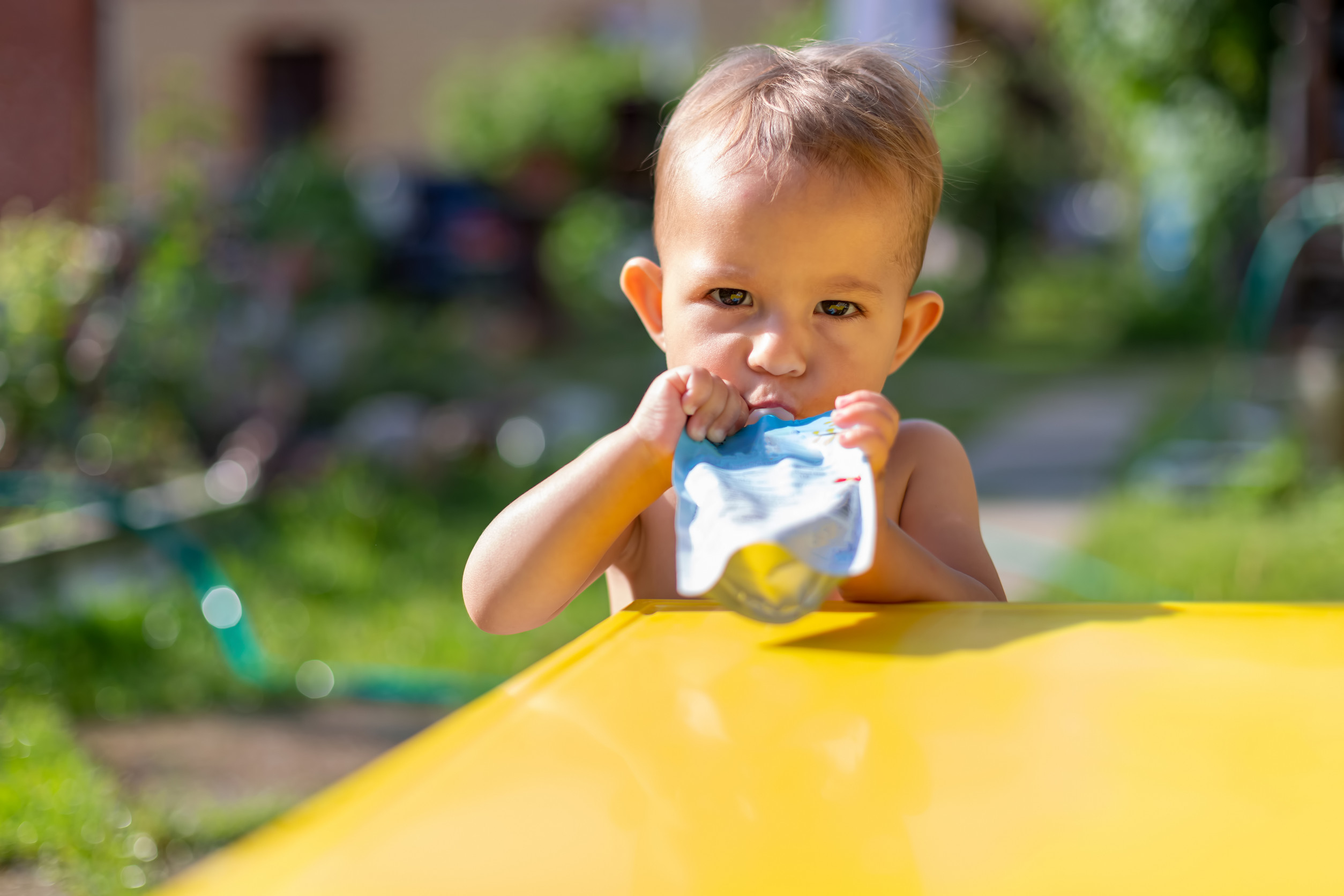They’re quick, mess-free, and babies love them—baby food pouches have taken over diaper bags and high chairs across the country. But recently, more parents are taking a closer look at what’s inside those colorful packets. Behind the convenience is a growing concern about nutrition, development, and long-term eating habits. Are these squeezable snacks supporting healthy growth, or just making life easier at a hidden cost? As it turns out, the pouch debate is more than just a parenting trend—it’s a wake-up call for modern baby feeding culture.
1. Pouches Are Often Loaded with Hidden Sugar
Many parents assume baby food pouches are healthy simply because they feature images of fruit and vegetables. But a closer look at the nutrition label often reveals high levels of naturally occurring or concentrated sugars. Even pouches labeled as “veggie blends” can contain mostly fruit puree to improve taste, pushing sugar content through the roof. This can condition young palates to prefer overly sweet foods. Over time, it may increase the risk of sugar addiction and poor eating habits.
2. They Can Delay Oral Motor Skill Development

Image Source: 123rf.com
Eating from a spoon or chewing soft solids helps babies develop important oral motor skills, like tongue movement and jaw strength. When babies suck purees from pouches instead, they skip those crucial physical motions. Pediatric therapists warn that prolonged pouch use may hinder speech development and proper chewing later on. The convenience of sucking on the go may seem harmless, but it’s not giving babies the full sensory experience of mealtime. True development happens when babies interact with food, not just slurp it.
3. They Promote Passive Eating Instead of Mealtime Engagement
One of the biggest perks of baby food pouches is the ability to feed without stopping for a proper meal. But that grab-and-go mentality can backfire when it comes to building healthy eating habits. Babies benefit from sitting down, exploring food textures, and learning the routine of eating with others. Pouches encourage distracted, passive eating—often in strollers, car seats, or while watching screens. This disconnect can lead to overeating and poor food relationships down the road.
4. Ingredient Labels Can Be Misleading
Just because a pouch says “kale and quinoa” on the front doesn’t mean that’s what your baby is actually getting in significant amounts. Many baby food pouches use small amounts of vegetables or whole grains mainly for marketing purposes, with the bulk of the pouch consisting of apple or pear puree. Without reading the fine print, it’s easy to think your child is eating a variety of foods when in reality, it’s just more fruit. Ingredient order matters—and fruit often takes the lead.
5. Some Contain Heavy Metals and Contaminants
A number of studies in recent years have revealed that some commercial baby foods—including pouches—contain detectable levels of heavy metals like lead, arsenic, and cadmium. These metals can affect brain development and behavior, especially in infants and toddlers. While the FDA has started to crack down on limits, many products still lack strict regulation. Parents concerned about long-term health risks are opting for homemade or freshly prepared alternatives instead. When it comes to baby food, transparency matters.
6. Portion Control Is Practically Impossible

Image Source: 123rf.com
One pouch often contains more food than a baby needs in a single serving, but without clear signals of fullness, babies may overeat. Unlike spoon-feeding, where you can watch for signs that your baby is full, sucking from a pouch makes it hard to know when to stop. Babies may consume an entire pouch out of habit or boredom, not hunger. Over time, this may disrupt natural hunger cues and self-regulation. Controlled portions are key to establishing healthy eating habits early.
7. They’re Not as Eco-Friendly as You Think
For eco-conscious families, baby food pouches may not align with sustainability goals. Most pouches are made of mixed materials that are difficult to recycle, and many end up in landfills. Even “eco-friendly” options can be hard to process through traditional recycling systems. Compared to reusable containers and homemade meals, pouches generate more waste per feeding. Sustainability matters—and parents are starting to factor that into their daily choices.
8. Whole Foods Encourages Better Nutritional Variety
When babies eat whole foods—like soft fruits, cooked vegetables, and small proteins—they’re exposed to a wider range of textures, flavors, and nutrients. This sets the stage for a more adventurous palate and stronger dietary habits later in life. In contrast, baby food pouches often blur tastes into a single puree, offering less sensory stimulation. Feeding real, varied food teaches babies how to chew, taste, and enjoy food in its natural state. The earlier they start, the better.
Maybe It’s Time to Rethink the Pouch
There’s no denying that baby food pouches are convenient, especially for busy parents. But convenience shouldn’t come at the cost of nutrition, development, and lifelong eating habits. More families are taking a blended approach—saving pouches for emergencies or travel while focusing on real, whole foods during regular meals. It’s not about judging other parents—it’s about making informed choices for your child’s health and future.
Do you use baby food pouches in your household, or have you started phasing them out? Share your experience and thoughts in the comments below!
Read More
Expecting a Baby? Here Are the Grocery Shopping Lists You Need
How To Feed a Family of Four on $100 a Week—Yes, It’s Possible


